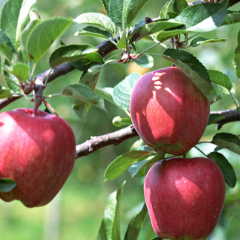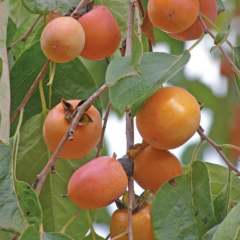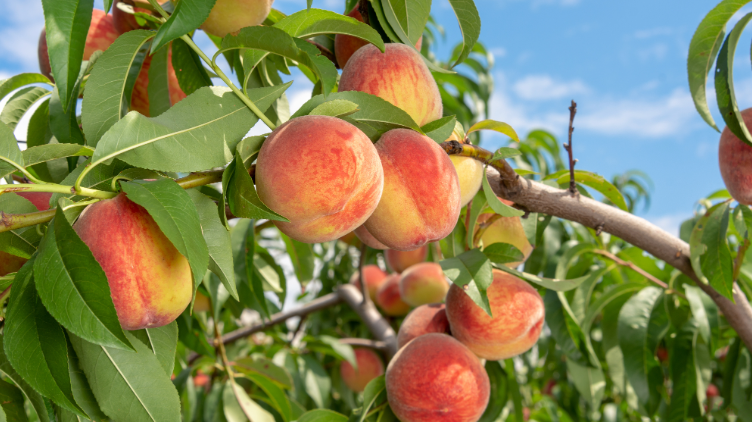
Your Kitchen Garden - Deciduous Fruit
12 Aug, 2024
Planting Tips
Winter is the best time to plant deciduous fruit trees as they are dormant and have shed their leaves for the season. Deciduous fruit trees grow well when planted in a sunny spot with at least six hours of sunlight each day, and soil that is both well-draining and rich in organic matter.
Deciduous fruit trees can be grown both in a container or in the ground depending on their size. While planting in a container offers more convenience and mobility, most fruit trees will eventually outgrow their containers and will need to be relocated to the ground. We love ballerina apples, dwarf peaches and dwarf nectarines for growing in pots.
When planting in containers, choose a large pot to give your plant room to grow. Plant into Kings Container Mix as it contains a wetting agent to help maintain moisture in the soil.
When planting in the ground, break up the existing soil and add Kings Compost at a 50:50 ratio. Mix in Kings Sheep Pellets, Kings Citrus & Fruit Tree Fertiliser and SaturAid, and water in well. If you have heavier clay soil, sprinkle Gypsum ClayBreaker at the bottom of the planting hole to improve the soil condition.
After planting, insert hardwood stakes on either side of the tree and secure with jute tie to provide support and stability as your fruit tree grows.
Our Top Varieties
With so many different varieties to choose from, there’s a deciduous fruit tree to suit every preference. Each variety has its own strengths, flavours, and culinary purposes, so here are a few of our favourites that will be hitting our stores this winter.
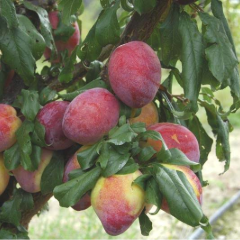
Plums
Lusia
This popular self-fertile variety produces sweet, firm and juicy fruit. It is a heavy and reliable cropper, with a striking elongated heart shape.
Santa Rosa
Known as the queen of all plums, Santa Rosa is one of the besttasting plums in the world! It is a self-fertile variety, making it perfect for small properties that have room for only one fruit tree.
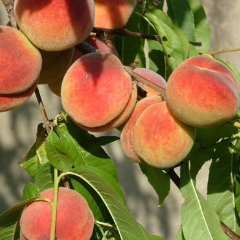
Peaches
Golden Queen
A classic peach that originated in New Zealand. With firm, deep golden flesh, this variety ripens later in the season and is perfect for bottling.
Bonanza (Dwarf)
A dwarf peach with large, sweet fruit and a compact growing habit. It is self-fertile, making it a great choice for smaller outdoor spaces.
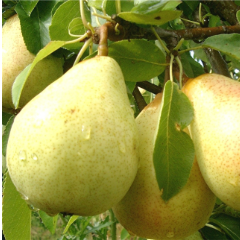
Pears
Beurre Bosc
With juicy sweet flesh and russet skin, these large, brown pears are vigorous mid-season fruiters. Plant another pear variety for crosspollination and bountiful harvests.
Garden Belle® (Dwarf)
The first true dwarf pear variety in New Zealand, this early-harvesting pear is self-fertile, and perfect for small gardens. Its sweet and juicy flesh tastes best when eaten straight from the tree.
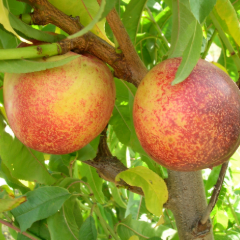
Nectarines
Garden Delight (Dwarf)
This early-season variety produces delicious, large fruit with juicy, yellow flesh. Its large blooms are a striking shade of pink.
Red Gold
Red Gold is popular for its sweet flavour almost like a peach. This late-season variety is a favourite amongst all who grow it.
Care
Watering
Watering fruit trees is essential, especially in the fi rst year after planting. This allows the roots to get well established, and ensures stronger, healthier plants. Water slowly so the water can sink down into the roots, rather than running off the top of the soil surface.
Feeding
Monthly feeds with Aquaticus Organic Garden Booster are essential from spring through autumn to encourage root growth and increased microbial activity in the soil. When planted in the ground, regular applications of Kings Sheep Pellets and Kings Citrus & Fruit Tree Fertiliser from spring through autumn will help with soil conditioning. When planted in containers, Kings Slow Release Citrus Food can be applied every three months to encourage strong roots and a healthy immune system.
Spraying
A regular spray program will help prevent pests and diseases, and keep your deciduous fruit trees growing well all year long. We recommend spraying with Grosafe FreeFlo Copper in winter and again prior to bud burst when the buds are swelling up, as a preventative measure for fungal diseases. During winter, spray with Grosafe Enspray 99 Oil to kill overwintering insects and prevent any future eggs from hatching.
Pruning
Mid-winter is the best time to prune your deciduous fruit trees, pruning up to a third of the total growth each year. Prune your trees on a fine day, removing all diseased and damaged wood, and any branches that are crossing or rubbing against each other. To create an open vase shape, remove branches that are growing back into the centre of the tree, and use small cuts at an angle about 15mm above outward-facing buds. This will promote growth away from the centre of the tree. If there are cuts above 15mm in thickness, seal with a pruning paste such as Grosafe Organic Pruning Paste.
